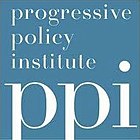Progressive Policy Institute
 | |
| Abbreviation | PPI |
|---|---|
| Formation | 1989 |
| Type | Public policy think tank |
| Location |
|
President and CEO | Will Marshall |
| Website | www |
| Part of a series on |
| New Democrats |
|---|
The Progressive Policy Institute (PPI) is a non-profit, 501(c)(3) organization that serves as a public policy think tank in the United States. The Democratic Leadership Council (DLC) founded it in 1989.[1] The Washington Post has described it as "a centrist Democratic institution."[2]
Key people[edit]
Its current president is Will Marshall, who writes on foreign policy, defense, national service, globalization, trade policy, and cultural issues. The organization's executive director is Lindsay Lewis.
Its chief economic strategist is Michael Mandel, who writes on innovation, growth, and the reduction of what he described as "regulatory accumulation."[3] Several former leading government officials have held senior positions or affiliations with the organization, including William Galston, Austan Goolsbee, Elaine Kamarck, Bruce Reed, Andrew Rotherham, Robert J. Shapiro, Paul Weinstein, and Ed Gresser.[4][5][6][7]
Center for New Liberalism[edit]
In February 2020, the Neoliberal Project joined as a new initiative of the Progressive Policy Institute.[8] Their network comprises over eighty chapters across the world.[9] The national organization produces a podcast,[10] conference[11] and livestreamed events.[12] The Neoliberal Project also runs an annual competition to select the "Neoliberal Shill" of the year.[13][14] In June 2020, the Neoliberal Project was reorganized as project of the newly created Center for New Liberalism.[15]
See also[edit]
References[edit]
- ^ From, Al (December 3, 2013). "Recruiting Bill Clinton". The Atlantic. Retrieved March 3, 2019.
We [the DLC] needed a political think tank with the capacity to develop politically potent, substantive ideas that our elected officials and political supporters could embrace. In January 1989, we created the Progressive Policy Institute (PPI).
- ^ Tankersley, Jim (March 15, 2016). "The new Democratic Party proposal to rival Bernie Sanders's socialism". The Washington Post. Retrieved March 3, 2019.
The Progressive Policy Institute is the latest centrist Democratic institution to try to counter that image.
- ^ Mandel, Michael. "Regulatory Improvement Commission: A Politically-Viable Approach to U.S. Regulatory Reform" (PDF). Progressive Policy Institute (2013).
- ^ Rampell, Catherine (11 November 2008). "Austan Goolsbee". The New York Times. ISSN 0362-4331. Retrieved 4 December 2016.
- ^ "Paul Weinstein". Progressive Policy Institute. Retrieved 4 December 2016.
- ^ Rotherham, Andrew J. (25 May 1999). "Testimony of Mr. Rotherham". archives.republicans.edlabor.house.gov. Retrieved 4 December 2016.
- ^ Galston, William; Kamarck, Elaine Ciulla (1989). "The Politics of Evasion: Democrats and the Presidency" (PDF). Progressive Policy Institute. Retrieved 4 December 2016.
- ^ "A New Chapter: The Neoliberal Project Joins PPI". Progressive Policy Institute. 10 February 2020. Retrieved 2020-11-15.
- ^ "Chapters". Neoliberal Project. Retrieved 2022-07-14.
- ^ "The Neoliberal Podcast". Neoliberal Project. Retrieved 2022-07-14.
- ^ "New Directions for Democrats". New Directions for Democrats. Retrieved 2022-07-14.
- ^ NeoliberalProject - Twitch, retrieved 2022-07-14
- ^ "Who Is The Neoliberal Shill Of The Year? : The Indicator from Planet Money". NPR.org. Retrieved 2022-03-18.
- ^ "BPR Interviews: The Neoliberal Project". Brown Political Review. 2019-10-25. Retrieved 2022-03-18.
- ^ "Announcing the Center for New Liberalism". Neoliberal Project. Retrieved 2022-03-20.
External links[edit]
- Democratic Party (United States) organizations
- Organizations established in 1989
- Political and economic think tanks in the United States
- Foreign policy and strategy think tanks in the United States
- Institutes based in the United States
- 501(c)(3) organizations
- Neoliberal organizations
- Centrist political advocacy groups in the United States
- United States organization stubs
